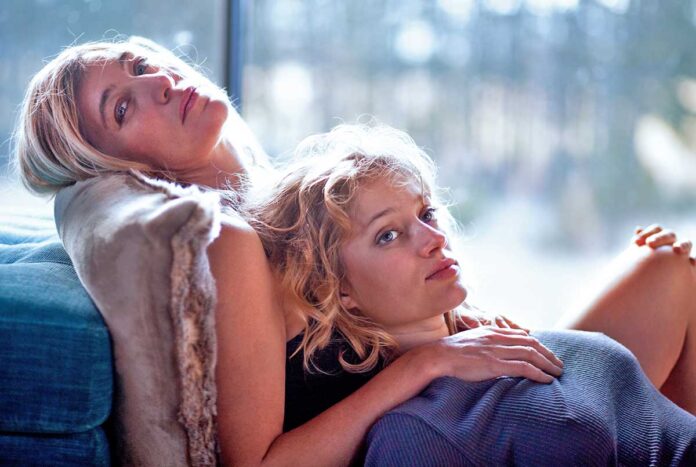The absorbing French thriller, “Only the Animals,” opening November 5 at the PFS Bourse, could almost be retitled, “Who Killed Evelyne?” Directed and cowritten by Dominik Moll, who adapted Colin Niel’s novel, the film recounts the stories of various characters who have a connection to the late bisexual Evelyne Ducat (Valerie Bruni Tedeschi), who is cheating on her husband Guillaume (Roland Plantin) with Marion (Nadia Tereszkiewicz).
But first, viewers meet Alice (Laure Calamy of “Call My Agent”), who lives with her husband Michel (Denis Ménochet) on a farm in Southern France. Alice is having an affair with Joseph (Damien Bonnard). Driving home from a tryst, Alice sees a car abandoned by the side of the road. (A snowstorm has just blanketed the area). On the news, Alice learns that the car belongs to Evelyne Ducat, who has gone missing.
Moll soon shifts the narrative to Joseph’s point of view. His was a bit brusque when Alice (in her section) came back for another bout of lovemaking. As his episode unfolds, it becomes clear why. Joseph has discovered Evelyne’s dead body on his property, and he seems more concerned about what to do about it instead of how it got there. “Only the Animals” shows how Joseph handles this tricky situation, but it also shrewdly illustrates how Alice misread Joseph’s behavior. As the film later reveals, Alice’s perspective, while informed by her knowledge, is actually far from the actual truth.
Herein lies the magic — or, gimmick — of Moll’s prismatic narrative strategy. Each episode recounts information that viewers understand (as all the pieces lock into place) but the characters don’t. Sure, it can be contrived at times, but it is gratifying that things that seem disparate are actually interconnected.
Evelyne is introduced in the third segment which focuses on Marion, her younger lover. The women meet in a restaurant in Sète, where Marion serves Evelyne. The women soon head back to Evelyne’s hotel room for some passionate sex. One night turns into two, but Evelyne must return home. Smitten with this attractive older woman, Marion tracks Evelyne down, and arrives, unexpectedly, on her new lover’s doorstep. Although Guillaume is away, she tells Marion to stay at a hotel, even giving her money for a room. Marion, however, refuses the offer, opting to stay at a campground instead. How their relationship plays out forms the core of “Only the Animals.”
Marion, not Evelyne, also figures prominently in the final section of the film, where Michel is chatting online with Amandine — who “looks” like Marion — but is, in fact, Armand (Guy Roger “Bibisse” N’Drin), a young man living in Abidjan. As Armand asks Michel for money, Michel sends thousands of Euros, thinking he is helping Marion, because Amandine claims she is in debt.
All this exposition perhaps reveals too much, but the characters each have secrets, and their storylines, which go in some unexpected directions, are all intriguing — even Alice’s narrative, which lays the groundwork for the film. “Only the Animals” unfolds like a handful of short films that overlap, but each section is gripping because of the little mysteries that arise: How did Michel’s nose get bloodied? Who was peeping on Marion at the campground? What happened to Joseph’s dog? And most importantly, how did Evelyne die? The answers, when they come, are all satisfying.
“Only the Animals” addresses themes of love and loneliness as these minidramas play out. Evelyne tells Marion she prefers to be alone, while Marion dreams of them being together. Michel tells Alice he doesn’t care about her affair but hopes she does not discover his relationship with Amandine. Armand, too, has a lover who is also out of reach. The film sizzles because viewers come to care about these characters even as they make poor choices and behave badly — perhaps because they do.
The performances are all engaging. Valerie Bruni Tedeschi is alluring as Evelyne, a woman who enjoys Marion in bed, but wants to “keep things light.” The actress keeps an air of mystery about her character, which enhances this story of her death. Marion, in contrast, is a bit needy, but as her story develops, she generates sympathy. Likewise, Denis Ménochet and Guy Roger “Bibisse” N’Drin are fantastic. Viewers will feel their yearning for love and connection. As all the love stories come to a head at the end, allowing the film to ask, who are the victims here?
“Only the Animals” is also gorgeously lensed (Patrick Ghiringhelli did the fine cinematography). The snowy Southern French landscapes look glorious; one can almost feel the brisk mountain air, and the bustling streets of Abidjan provide a vibrant setting for a nifty chase scene.
Moll’s film ends with a final reveal that viewers may see coming, but like “Only the Animals,” is it rewarding, nonetheless.
